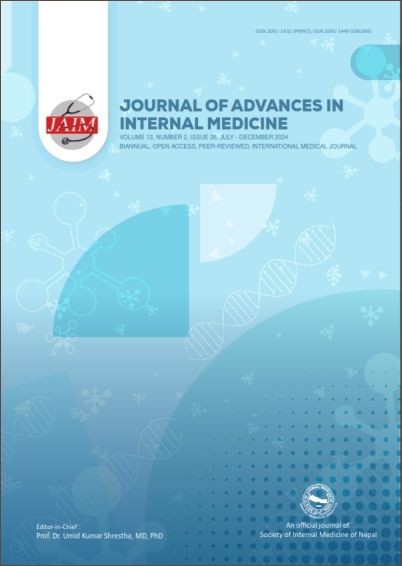Thyroid Disorders in Patients with Type 2 Diabetes Mellitus
DOI:
https://doi.org/10.3126/jaim.v13i2.74073Keywords:
Diabetes mellitus, type 2, hypothyroidism, prevalence, thyroid diseasesAbstract
BACKGROUND Diabetes mellitus is a public health problem world wide. Diabetes and thyroid disorders influence each other and tend to coexist. The recognition of this relationship is essential for achieving treatment goals. So, we conducted this study to find out the prevalence of thyroid disorders in patients with type two diabetes mellitus presenting to the department of internal medicine and endocrinology unit.
METHODS It was a descriptive cross-sectional study conducted in the Department of Internal Medicine and Endocrinology unit of Bir Hospital from June 2018 to May 2018. Ethical clearance was obtained from the institutional review committee. Patients with Type two diabetes mellitus were evaluated for thyroid dysfunctions. The various thyroid dysfunctions with gender, age, control of diabetes and duration of diabetes were studied. The results were analyzed by using the Statistical Package for the Social Sciences version 21. Point estimate at 95% Confidence Interval was calculated along with frequency and proportion for binary data.
RESULTS The prevalence of thyroid dysfunction among 50 patients enrolled was 15(30%) ( n-n at 95% confidence interval). Thyroid dysfunctions were greater in females 10(66.66%) while 5(33.33%) in male. Out of 15 cases with thyroid dysfunctions, sub-clinical hypothyroidism was the most prevalent 11(22%) followed by primary hyperthyroidism in 2(4%), primary hypothyroidism in 1(2%), and sub-clinical hyperthyroidism in 1(2%).
CONCLUSIONS The prevalence of thyroid dysfunctions was comparable from study from Eastern Nepal while higher than from study from Jordan and Greece. Sub-clinical hypothyroidism was the most frequently occurring thyroid dysfunction.
Downloads
Downloads
Published
How to Cite
Issue
Section
License

This work is licensed under a Creative Commons Attribution 4.0 International License.
This license enables reusers to distribute, remix, adapt, and build upon the material in any medium or format, so long as attribution is given to the creator.




